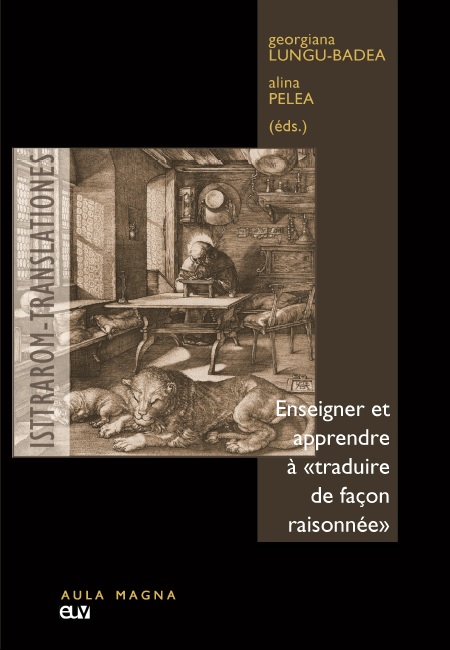
We kindly inform you that, as long as the subject affiliation of our 300.000+ articles is in progress, you might get unsufficient or no results on your third level or second level search. In this case, please broaden your search criteria.

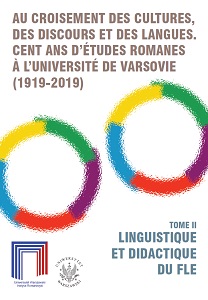
The specialized language of a specific area constitutes a subsystem of a given language and, therefore, texts can never be purely specialized. Likewise, in everyday life, we do not use only the general language. In this study, we present the Polish translations of extracts from literary texts from different French-language authors, notably from Victor Hugo, Didier van Cauwelaert and Vladimir Volkoff. We indicate the presence of specialized vocabulary and speech in the starting texts and their treatment in the arrival texts. We indicate a few translation errors, but above all we will discuss the importance of the encyclopaedic knowledge of the translator of literary texts. To conclude, we offer some reflections on the training of translators so that they know how to deal with the elements of specialized language in literary texts.
More...
This contribution offers a theoretical reflection on the notion of interdiscourse (shown and manifest) and its relevance in (literary) discourse analysis before analysing a work whose political and literary project is largely based on the inter-discourse: "The Coming Insurrection", by «Invisible Commitee». The notion of interdiscourse in our corpus will allow us to assess the extent of an uncompromising critique of the economy and more broadly of the capitalist system: individualism, homogenization, evidence. We can then consider the subversion induced by interdiscourse, which consists precisely in assuming the need to make common, to include otherness, to pluralize discourses but also practices, and finally to undo the common discourse (economic and political) of its alleged obviousness.
More...
The purpose of this article is to tackle the issue of innovations in language teaching, with an emphasis on the latest trends in education. Currently, three approaches are changing traditional teaching methodology: flipped classrooms, learning by teaching, and virtual classrooms. In a university context, students have not yet had large amounts of exposure to these recent didactic solutions. This research investigates the willingness of students to adopt these new pedagogical approaches based largely on digital media. Additionally, this research explores how teachers and students view the effectiveness of these three approaches in various university contexts, such as lectures, tutorials, and seminars.
More...
The grammatical competence is a component of communicative competence, but in practice the communication skills often prevail over language correctness. Nevertheless, it should be remembered that the use of language subsystems in accordance with grammatical rules is the basis for precise and effective verbal communication, especially in a professional context, and may indicate the professionalism of the language user. The subject of this text is a reflection on the role of grammatical elements in professional communication and on the place of grammar in specialist language programs and effective ways of teaching it. The learner’s profile and his/her needs will be the starting points to discuss possible approaches to teaching grammar.
More...
The progression undertaken by foreign language teaching in the institutional context is often a faithful reflection of the CEFR scales, especially since it follows the progression endorsed by school workbooks. Consequently, this teaching seems to impose, but without any explicit recognition, an articulation of formal learning activities with informal learning sequences roughly understood as referring to communication activities which are not provided with educational forms. Our paper takes up, very modestly, the methodological challenge of determining the place of informal learning at the time of the CEFR-shaped teaching, which would consist in highlighting the concept of informal learning as a necessary component of every foreign language learning process, leading significantly to upgrade the level of communication competence, in order to recognize it accordingly.
More...
In this article, we are interested in the use of Podcasts for learning purposes by Moroccan students. We will be analyzing the effect of this tool in terms of the French written language of the Ibn Zohr’s University students, in Agadir. Being interested to this problematic, means first of all being interested to the learning process of the students via the Podcasts, before focusing on the learning product. At this level, several questions could be developed.
More...
In this paper we are interested in the realization of schwa (/ə/) by Greek-speaking learners, considering the challenge that is addressed to many learners of French as a foreign language. Our research was based on the principles set out by the IPFC (Interphonologie du Français Contemporain) project and conducted by means of a non-spontaneous corpus study. The paper first briefly outlines the behavior of the schwa and the interest of the study. It then deals with the way FFL textbooks introduce the schwa to pre-intermediate learners. Finally, the research is presented and the conclusions achieved are discussed.
More...
Modern societies in Europe are characterized by linguistic and cultural diversity. The European Union attaches great importance to the development, in the individual, of the plurilingual and pluricultural competence and to the role of the language learning as a mode of openness and access to otherness. These orientations are also given by number of works and projects carried out by the Council of Europe. Today’s language educators have to redefine their work and adapt it to the new context. One of the questions rising for the educators of French as a second language is the following: How can we evaluate the plurilingual and pluricultural competence of the learners? In the present paper, we propose to evaluate the development of the plurilingual and pluricultural competence of the learners of French as a second language in school by the interlinguistic mediation and we present the results of a field research held in Greece.
More...
This article examines intercultural mediation through the stories of plurilingual “migrant” writers. These texts, whose authors live or have lived between several languages and have written in several languages including French, contribute towards building plurilingual and pluricultural competences as well as metalinguistic awareness in French as a Foreign Language learners. The language biography, as a training or self-training tool, enables learners to reflect on the notions of identity and belonging between languages and cultures.
More...
When someone think about learning a foreign language, the concepts that come to mind are grammar, vocabulary, verbs, spelling, and phonetics. It is less common to wonder how others think their language. Galisson proposed the concept of lexiculture. The CEFR emphasizes the ideas of intercultural values and misunderstandings. A typical language course does not give strategies to manage these questions. To address this shortcoming, we propose a double approach. The first is based on the communicative and cultural processes during a conversation between natives. The second is based on understanding how to report knowledge, the construction of knowledge, and discursive grammar. From there, our didactic objective is twofold: (1) to articulate the communicative-cultural processes and the dimensions of the teaching process to focus on the cultural meaning of the words studied in the course; and (2) to give students the tools to manage the approach of the interculturality.
More...
For the past 20 years, most FFL textbooks have, to a certain extent, adopted the actional approach. This evolution represents a specific challenge for philological departments. On the one hand, teaching-programs tend to adjust to the common framework. But, on the other hand, linguistics and literary curricula are not immediately compatible with the new methods. While reminding its readers about the importance of the literary heritage, the CEF (2001) give no practical tool to pursue this ambition. In this paper, we propose a way of reactivating the knowledge acquired in literary classes by inserting it in a broader context: the study of argumentation as presented by Perelman’s New Rhetoric. The link between argumentation and literature is inspired by "Le Comique du discours" (Olbrechts-Tyteca, 1974). To give some flesh to this concept we will refer to Flaubert’s "Bouvard et Pécuchet" (1880), an intrigue and a text most Romanists are familiar with.
More...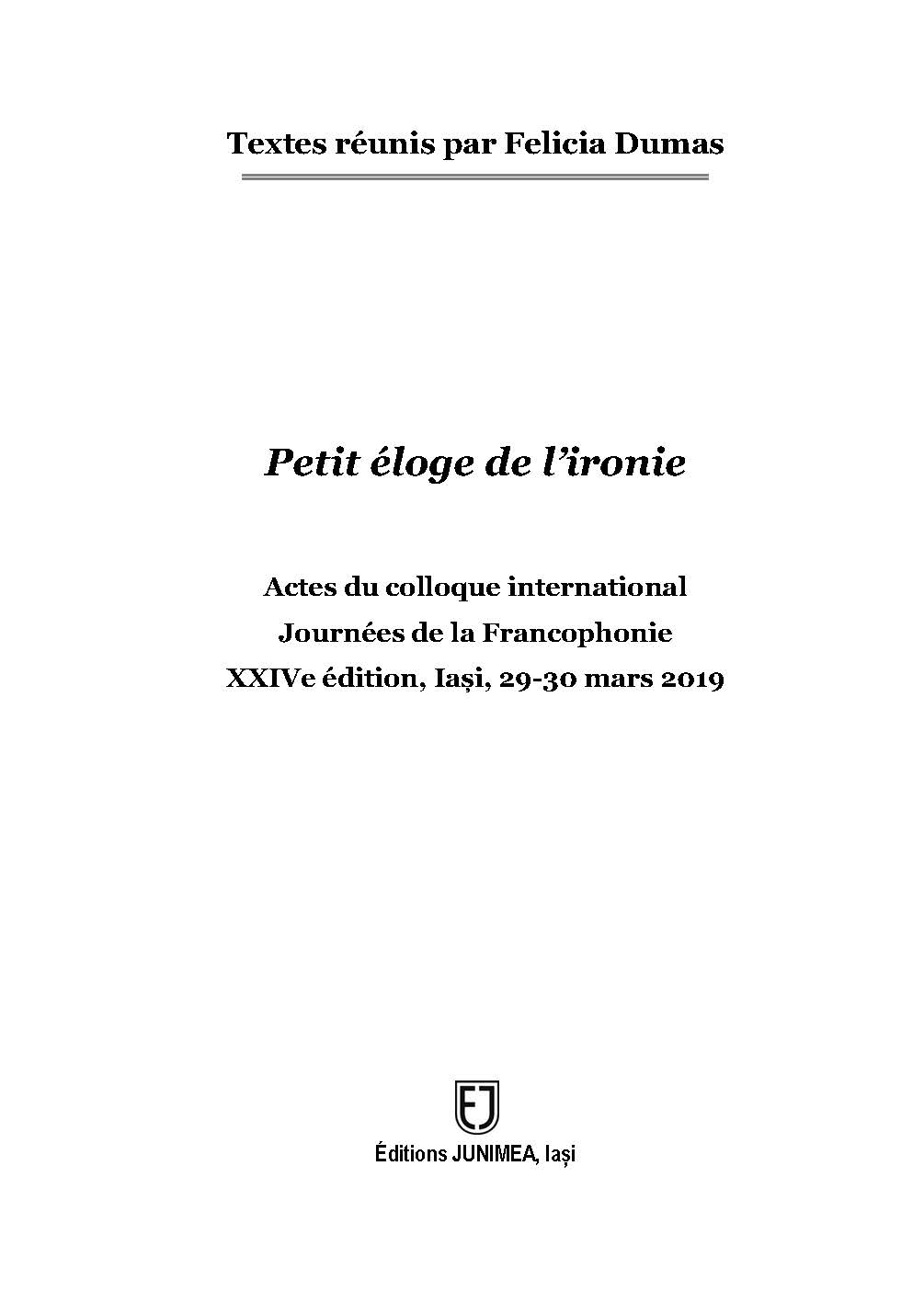
Our article intends to observe the phenomenon of irony at the semantic discursive and rhetorical-argumentative level. We will insist on certain actualisation strategies, particularly discursive antonymy and defrosting. Irony is at the same time bearer of contradictions and trigger of semantic-lexical and discursive antonymy. Irony helps with the re-organisation of language and speech using both linguistic and extra-linguistic (semantic-pragmatic and discursive-argumentative) factors.
More...
The main purpose of this article is to prove that irony can be an efficient argumentative technique, more specifically, a dissociative one, built on logical and psycho-social grounds. From a theoretical point of view, dissociation as argumentative technique was first discussed by Perelman and Tyteca in their famous Treatise of Argumentation: The New Rhetoric and further analyzed and refined in a pragmadialectical approach by the Dutch linguists of University of Amsterdam (and especially Agnes van Rees). Irony can be described as an argumentative technique producing a break between the psychological and conceptual background of the receiver and the actualization of the message. It results therefore an epistemic clash at the receiver in the same way as the argumentative dissociation diverts the existing meanings of a concept carried by the message. Our attempt is to prove that the argumentative force of irony as argumentative technique seen as associative, apparently, but being in the same time deeply dissociative, leads to an epistemic renewal at the reception pole.
More...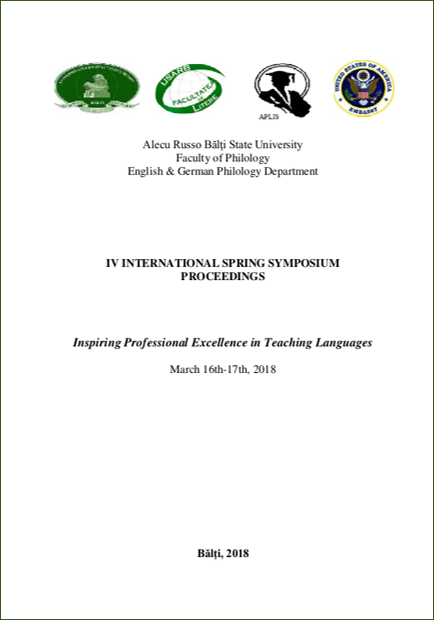
The article studies the lexical-semantic field "Greed" in the German and Russian languages. The relevance of the study of the problem of lexical-semantic fields is attributed to the fact that, the field, representing in itself the hierarchical structure of the set of lexical units which are united by a common meaning and reflecting a certain conceptual sphere in the language, allows to establish the diverse aspects of its lexical units, to identify their nationally specific features. The structure of lexical-semantic groups of nouns, adjectives and verbs that make up this lexical-semantic field in both languages is analyzed by means of definitional and componential analyses. The paradigmatic connections between its components are determined and analyzed and on this basis, the general and specific features of the lexical means of verbalization of the studied lexical-semantic field in the German and Russian languages are defined.
More...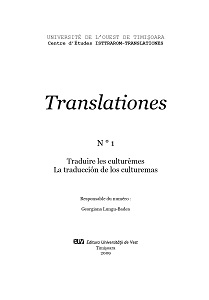
Poems by Adrian Bodnaru from the volume "Verses and other fixed forms": "A", "Doină", "Haiku", from the volume of poems "All rights reserved, inclusive Sweden and Norway", from the volume of poems "The day after tomorrow".
More...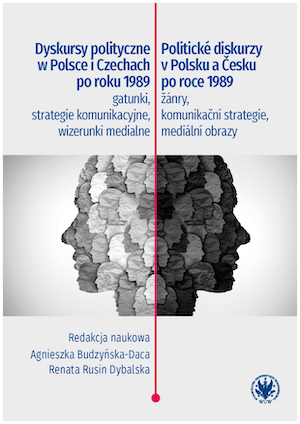
The subject of the analysis are the activities of Prime Ministers Morawiecki and Babiš on Twitter during the 2019 European elections. The aim of the analysis is, on the one hand, to find out whether politicians use image attributional treatments and, if so, how they do it, what is the leitmotif of such a message. The analysis is intended to help answer the question about the purpose of such treatments: why politicians use „politics without politics” and how these actions affect the course and dynamics of the election campaign.
More...
The aim of the paper is to reconstruct discursive strategies of the Polish right-wing party Confederation Liberty and Independence on the basis of the tracks recorded by its politicians for a charity event called Hot16Challenge. The approach used in the paper was the Discourse-Historical Approach. In the tracks, Confederation clearly indicates its enemies – other politicians and supporters of socialism. The politicians of the party market themselves as defenders of values and competent professionals. Discursive strategies of the party are similar to the strategies of other contemporary European far-right parties.
More...
There is no pandemic without politics. When the coronavirus becomes a problem of a given country, politics starts to drastically influence the privacy of the citizens, which is reflected in the content created by the Internet users. I decided to analyse the memes referring to coronavirus which were shared on popular, comparable Facebook meme groups in Poland and the Czech Republic in order to see how the political discourses concerning the pandemic –introducing restrictions, the state narration about the pandemic, or the role of the politicians in the crisis situation – are reflected in the popular culture of the Internet. The period analysed was the time just before announcing the beginning of the pandemic and the first months of it: in that period the danger of infection with the coronavirus in Poland and the Czech Republic was relatively small, and so the major part of the discourse devoted to the illness was shaped by political decisions. The analysis has shown that the Czech society bore the beginning of the pandemic much worse than the Poles, as the Czechs produced more coronavirus Internet memes and focused heavily on the issues of politics and their own country. In both countries, the pandemic was associated mostly with the prime minister and the minister of health, and in the Czech Republic also with the minister of the interior. Although different aspects of life under the pandemic, such as hygiene or working from home, in both countries were popular to a similar extent, some important differences appeared; for example, panic buying was significantly more important for the Czechs and the ban on gatherings for the Poles. Both Polish and Czech internet users used their known cultural codes to tame the pandemic; these codes differed and showed the properties of both cultures, e.g. the Christian character of the Polish culture. The pandemic circumstances were also adapted into several, specific for both cultures, genres of memes. At the end of the article, I am considering the therapeutical aspect of the Internet memes and I turn to the conception of popular political discourse, diluted in order to reduce the level of trauma caused by the enduring crisis situation.
More...
The article shows the most popular eponyms present in contemporary political discourse. It aims to determine how they are created and what their function is. Increasingly often the sources of eponyms and derivatives of proper names are not only surnames, which have been used as the basis for eponyms of a political character before (e.g. Kuroniówka). These are also names (e.g. klaudymy, mateuszki) and acronyms (e.g. pisiewicze, platfusy), as well as city names (e.g. smoleńszczaki). For the language of politics it is also characteristic to create words derived from names, including verbs (e.g. gowinować). The material is extracted from various sources, recording or containing the lexis of political discourse, in particular texts from the press and Internet sources.
More...